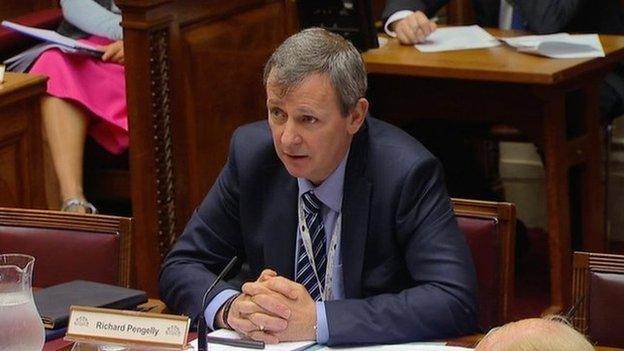Public apology to neurology patients over recall
- Published

Richard Pengelly issued a public apology on behalf of the health service
Neurology patients affected by Northern Ireland's biggest health recall have received an apology from the Department of Health's top civil servant.
Over 2,500 people are being reassessed after an independent review of medical notes relating to the work of consultant neurologist Dr Michael Watt.
The recall by the Belfast Health Trust began earlier this month.
Permanent secretary, Richard Pengelly, said the health and social care services "apologised unreservedly".
Mr Pengelly told a conference in Templepatrick, County Antrim, that a review into the issue would be "open and robust".
He insisted that anything less than complete cooperation from all parts of the system "will simply not be acceptable".
Not only was it the biggest ever recall of patients in Northern Ireland, it is also the most serious.
Potential misdiagnosis
Neurology is the treatment of brain conditions including MS, Parkinson's Disease, stroke and Motor Neurone Disease - all of which can be life-changing.
The recall has left many patients very concerned about the potential for misdiagnosis, however, many of Dr Watt's former patients have expressed support and gratitude for the care he provided.
Some patients praised his bedside manner but admitted to being concerned about his workload.
Neurology is the treatment of brain conditions and certain diagnoses can be life-changing
Dr Watt is an experienced consultant neurologist employed at the Royal Victoria and City hospitals in Belfast.
As well as his NHS work, he also treated private patients at the Ulster Independent Clinic and Hillsborough Private Clinic.
The Belfast Health Trust became aware of a potential problem with his work in December 2016, when a formal concern was raised by a GP.
Additional clinics
He has not seen any patients since June 2017 but the trust's concerns were only made public at the beginning of this month.
The patients affected by the recall have been offered a full clinical assessment by another consultant neurologist.
The trust has organised 200 additional clinics over a three-month period, and the re-assessments began on 5 May.
The General Medical Council has said it will investigate the misdiagnosis concerns.
The Department of Health has also asked for a review of the records of all patients or former patients of Dr Watt who have died over the past 10 years.
- Published21 May 2018
- Published2 May 2018